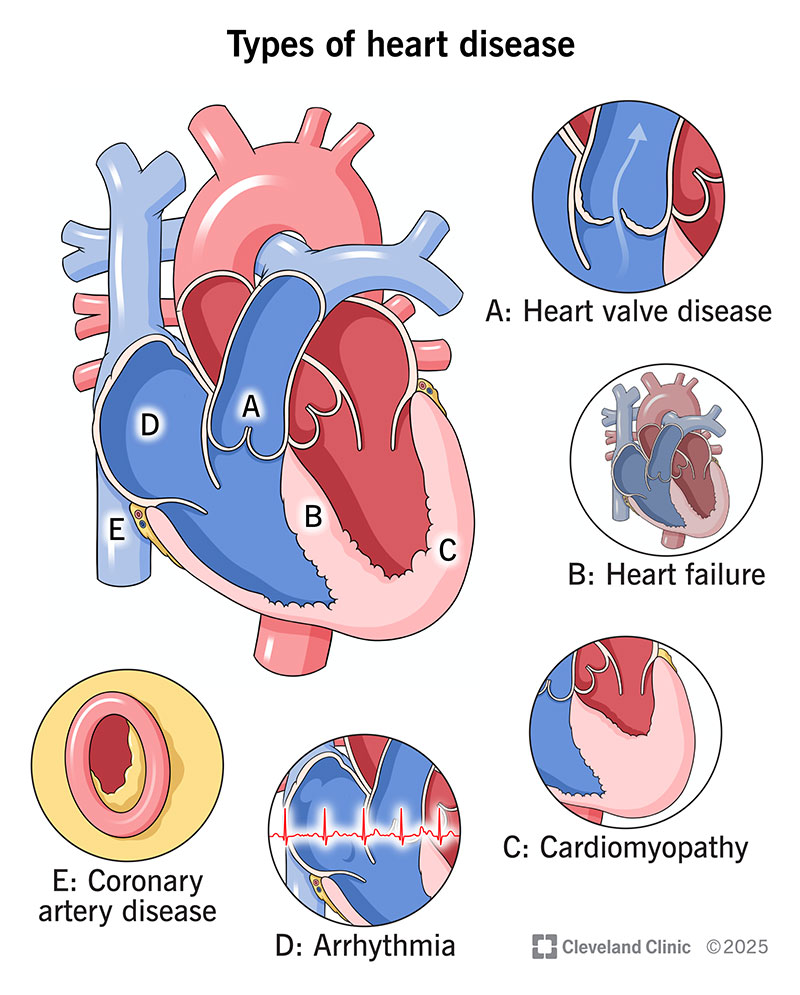Heart disease includes many diseases that affect your heart, but coronary artery disease (CAD) is the most common and familiar one. CAD can create a waxy buildup in your heart’s arteries that can cause a heart attack. Healthy habits, medicines and procedures can prevent or treat CAD and other heart diseases.

Heart disease is a variety of issues that can affect your heart. When people think about heart disease, they often think of the most common type — coronary artery disease (CAD) and the heart attacks it can cause. But you can have trouble with different parts of your heart, like your heart muscle, valves or electrical system.
When your heart isn’t working well, it has trouble sending enough blood, oxygen and nutrients to your body. In a way, your heart delivers the fuel that keeps your body’s systems running. If there’s a problem with delivering that fuel, it affects everything your body’s systems do.
Lifestyle changes and medications can keep your heart healthy and lower your chances of getting heart disease.
Heart disease types include:
Heart disease is the top cause of death in the United States. In 2021, heart disease caused 1 in 5 deaths. That’s nearly 700,000 people. Coronary artery disease, the most common type of heart disease, caused about 375,000 of those deaths.
Heart disease affects people from most ethnic backgrounds, regardless of sex.
Cleveland Clinic is a non-profit academic medical center. Advertising on our site helps support our mission. We do not endorse non-Cleveland Clinic products or services. Policy
You can have different symptoms of heart disease depending on what’s wrong. Heart disease symptoms may include:
Early warning signs of heart disease include:
Different types of heart disease have different causes. Heart disease causes include:
Heart disease causes may be more likely to happen to you if you have certain risk factors. Risk factors for heart disease include:
Some types of heart disease can lead to other kinds of heart disease. Complications of heart disease — many of which are life-threatening — include:
A provider can make a heart disease diagnosis after:
Tests to diagnose various types of heart disease include:
Depending on your heart issue, you may need to make changes to your daily life, take medication or have surgery.
Heart disease treatments may include:
Most prescription medications have some side effects. Medicines you take to lower your blood pressure can make you dizzy or tired or give you a headache. The most common medications that help you manage your cholesterol levels can give you sore muscles, nausea or headaches.
Surgeries or procedures have some risks, like bleeding, stroke, abnormal heartbeats, infection or other issues.
Depending on the surgery or procedure you have, your recovery can take a few days to many weeks. You may only need a few days to recover from minor procedures. But you may need two to four weeks to recover from minimally invasive surgery and six to 12 weeks to recover from open-heart surgery.
You can lower your risk of some kinds of heart disease in these ways:
You can’t prevent congenital heart disease because you’re born with it.
Medications and/or procedures can help people who have various types of heart disease. It’s easier to treat most types of heart disease if you get an early diagnosis instead of waiting for symptoms to get worse. Many people can live full lives when they follow their healthcare provider’s treatment plan.
If you have coronary artery disease (the most common kind of heart disease), you can improve your health by making changes to your daily life. This may include reducing how much salt and saturated fat you eat and increasing how much you exercise. In addition, a provider may recommend taking medicine to lower your cholesterol and/or blood pressure.
If you have a biological family history of heart disease, you may want to ask your provider if you have other risk factors. If you do, you can make a plan to help prevent heart disease.
Contact your provider if you have heart disease symptoms.
Call your local emergency number if you suddenly experience these issues:
You may want to ask your healthcare provider:
A note from Cleveland Clinic
Your heart has a crucial job, so it’s important to pay attention to warning signs of a heart issue. Many heart diseases develop over time. Identifying heart disease early gives you the best chance of managing it well. Talk with a healthcare provider about the best ways to prevent heart disease or keep it from getting worse. Even if you have risk factors you can’t change, there are other things you have the power to change.
Last reviewed by a Cleveland Clinic medical professional on 11/06/2023.
Learn more about our editorial process.
Cleveland Clinic is a non-profit academic medical center. Advertising on our site helps support our mission. We do not endorse non-Cleveland Clinic products or services. Policy